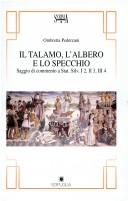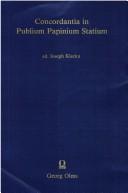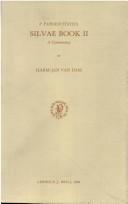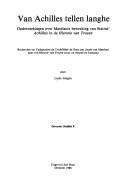| Listing 1 - 10 of 39 | << page >> |
Sort by
|
Book
ISBN: 9788876426957 8876426957 Year: 2021 Publisher: Pisa Edizioni della Normale
Abstract | Keywords | Export | Availability | Bookmark
 Loading...
Loading...Choose an application
- Reference Manager
- EndNote
- RefWorks (Direct export to RefWorks)
Statius, Publius Papinius --- Statius, P. Papinius --- Estacio --- Stace --- Statius, Papinius --- Stat︠s︡iĭ, Publiĭ Papiniĭ --- Стаций, Публий Папиний --- Stazio --- Ekphrasis. --- Art and literature. --- Stace, --- Critique et interprétation

ISBN: 8872281326 Year: 1995 Volume: 8 Publisher: Bari Edipuglia
Abstract | Keywords | Export | Availability | Bookmark
 Loading...
Loading...Choose an application
- Reference Manager
- EndNote
- RefWorks (Direct export to RefWorks)
Laudatory poetry, Latin --- -Occasional verse, Latin --- -Latin occasional verse --- Latin poetry --- Latin laudatory poetry --- History and criticism --- Statius, P. Papinius --- Rome --- In literature. --- Publius Papinius Statius --- Statius, Papinius --- Stace --- -History and criticism --- Occasional verse, Latin

ISBN: 3515086838 Year: 2005 Volume: 14 Publisher: Stuttgart Steiner
Abstract | Keywords | Export | Availability | Bookmark
 Loading...
Loading...Choose an application
- Reference Manager
- EndNote
- RefWorks (Direct export to RefWorks)
Statius, P. Papinius --- Seven against Thebes (Greek mythology) in literature. --- Seven against Thebes (Greek mythology) --- Seven against Thebes (Greek mythology) in literature --- Estacio --- Stace --- Statius, Papinius --- Stat︠s︡iĭ, Publiĭ Papiniĭ --- Стаций, Публий Папиний --- Stazio --- Statius, Publius Papinius
Book
ISBN: 3484600349 Year: 1973 Publisher: Tübingen Niemeyer
Abstract | Keywords | Export | Availability | Bookmark
 Loading...
Loading...Choose an application
- Reference Manager
- EndNote
- RefWorks (Direct export to RefWorks)
Latin language --- -Seven against Thebes (Greek mythology) in literature --- Classical languages --- Italic languages and dialects --- Classical philology --- Latin philology --- Metrics and rhythmics --- Statius, P. Papinius --- -Versification --- Seven against Thebes (Greek mythology) in literature. --- Metrics and rhythmics. --- Versification. --- -Publius Papinius Statius --- Statius, Papinius --- Stace --- Versification --- Seven against Thebes (Greek mythology) in literature --- Estacio --- Statius, Publius Papinius --- Stat︠s︡iĭ, Publiĭ Papiniĭ --- Стаций, Публий Папиний --- Stazio
Book
ISBN: 9789004171343 9004171347 9786612400339 1282400339 9047424654 9789047424659 Year: 2008 Volume: 306 Publisher: Leiden: Brill,
Abstract | Keywords | Export | Availability | Bookmark
 Loading...
Loading...Choose an application
- Reference Manager
- EndNote
- RefWorks (Direct export to RefWorks)
The Roman poet P. Papinius Statius (ca. 45-96) is the author of two epics (the Thebaid and the unfinished Achilleid ) and a large corpus of occasional verse ( Silvae ). This poetry, long seen as derivative or decadent, is increasingly appreciated for the daring and originality of its responses both to the Greek and Latin literary tradition and to the contemporary Roman world. This volume offers the papers delivered at a symposium on Statius (Amsterdam 2005) by leading scholars in the field from Europe and North America. These papers demonstrate the fascination of Statius' poetry on account of the poet's vast knowledge of Greek and Latin tragedy, his rapid narrative, psychological acumen, brilliant eulogies, and pessimistic views on gods and men. The focus of the collection is on literary technique in the Thebaid , on socio-historical aspects of the Silvae , and on the reception of Statius in European literature and scholarship.
Epic poetry, Latin --- History and criticism. --- Statius, P. Papinius --- Criticism and interpretation. --- History and criticism --- Statius, Publius Papinius --- Criticism and interpretation --- Poésie épique latine --- Histoire et critique --- Estacio --- Stace --- Statius, Papinius --- Stat︠s︡iĭ, Publiĭ Papiniĭ --- Стаций, Публий Папиний --- Stazio --- Epic poetry, Latin - History and criticism --- Statius, Publius Papinius - Criticism and interpretation
Book
ISSN: 18723357 ISBN: 9004284702 9789004284708 9789004217898 9004217894 Year: 2015 Publisher: Leiden Brill
Abstract | Keywords | Export | Availability | Bookmark
 Loading...
Loading...Choose an application
- Reference Manager
- EndNote
- RefWorks (Direct export to RefWorks)
Brill’s Companion to Statius is the first companion volume to be published on arguably the most important Roman poet of the Flavian period. Thirty-four newly commissioned chapters from international experts provide a comprehensive overview of recent approaches to Statius, discuss the fundamental issues and themes of his poetry, and suggest new fruitful areas for research. All of his works are considered: the Thebaid , his longest extant epic; the Achilleid , his unfinished epic; and the Silvae , his collected short poetry. Particular themes explored include the social, cultural, and political issues surrounding his poetry; his controversial aesthetic; the influence of his predecessors upon his poetry; and the scholarly and literary reception of his poetry in subsequent ages to the present.
Statius, P. Papinius --- Estacio --- Stace --- Statius, Papinius --- Statius, Publius Papinius --- Stat︠s︡iĭ, Publiĭ Papiniĭ --- Стаций, Публий Папиний --- Criticism and interpretation. --- Stazio --- Littérature latine --- Critique et interprétation. --- Stace, --- Stace (0040?-0096). --- Statius, P. Papinius. --- Statius, Publius Papinius, --- Statius, Publius Papinius. --- Epic poetry, Latin --- History and criticism --- Criticism and interpretation --- Statius, P. Papinius - (Publius Papinius) - Criticism and interpretation --- Statius, P. Papinius - (Publius Papinius)
Book
ISBN: 9788836130702 8836130704 Year: 2020 Publisher: Alessandria Edizioni dell'Orso
Abstract | Keywords | Export | Availability | Bookmark
 Loading...
Loading...Choose an application
- Reference Manager
- EndNote
- RefWorks (Direct export to RefWorks)
Seven against Thebes (Greek mythology) in literature --- Statius, P. Papinius --- Tydeus --- Polynices --- Polineikes --- Polinice --- Polinices --- Polinik --- Poliniko --- Polinizes --- Polyneices --- Polyneikēs --- Polynice --- Polynikes --- Полінік --- ポリュネイケース --- פוליניקס --- 폴리네이케스 --- Полиник --- Палінік --- Πολυνείκης --- In literature. --- Stace (0040?-0096). --- Stace --- Critique et interprétation. --- Statius, Publius Papinius --- Estacio --- Statius, Papinius --- Stat︠s︡iĭ, Publiĭ Papiniĭ --- Стаций, Публий Папиний --- Stazio

ISBN: 3487072300 9783487072302 Year: 1983 Volume: 57 Publisher: Hildesheim Olms
Abstract | Keywords | Export | Availability | Bookmark
 Loading...
Loading...Choose an application
- Reference Manager
- EndNote
- RefWorks (Direct export to RefWorks)
Classical Latin literature --- Classical Latin language --- Statius, Publius Papinius --- Occasional verse, Latin --- Epic poetry, Latin --- Concordances --- Statius, P Papinius --- -Occasional verse, Latin --- -Latin occasional verse --- Latin poetry --- Latin epic poetry --- Statius, P. Papinius --- -Concordances --- Concordances. --- -Publius Papinius Statius --- Statius, Papinius --- Stace --- Latin occasional verse --- Estacio --- Stat︠s︡iĭ, Publiĭ Papiniĭ --- Стаций, Публий Папиний --- Stazio --- Occasional verse, Latin - Concordances --- Epic poetry, Latin - Concordances --- Statius, P Papinius - (Publius Papinius) - Concordances --- Statius, P Papinius - (Publius Papinius)

ISBN: 9004071105 9004328173 9789004071100 Year: 1984 Volume: 82 Publisher: Leiden
Abstract | Keywords | Export | Availability | Bookmark
 Loading...
Loading...Choose an application
- Reference Manager
- EndNote
- RefWorks (Direct export to RefWorks)
The five books of the Silvae bring together the occasional verses which Statius wrote in addition to his two epics. In these short descriptive poems Statius elaborates features taken from various genres into an original whole, in which description and eulogy play important roles. The main themes of the poems of his second book are consolation after bereavement and the contrast between nature and culture. The present work contains a general introduction, a text of Silvae II, a bibliography, and an index, together with a verse-by-verse commentary on the poems of this second book. This is the first commentary on a book of the Silvae since Vollmer's commentary on the whole of the Silvae of 1898. Emphasis is here placed on interpretation and moreover chiefly on the literary and stylistic aspects of the poems, which, compared with the epic poetry of Statius and his contemporaries, have hitherto received relatively little attention.
Statius, Publius Papinius --- Latin poetry --- Poésie latine --- History and criticism --- Histoire et critique --- Statius, P. Papinius --- Occasional verse, Latin --- Laudatory poetry, Latin --- Statius, P Papinius --- Rome --- In literature --- -Occasional verse, Latin --- -Rome in literature --- Latin occasional verse --- Latin laudatory poetry --- Rome in literature. --- History and criticism. --- Publius Papinius Statius --- Statius, Papinius --- Stace --- Poésie latine --- In literature. --- Statius, P. Papinius (Publius Papinius) --- Occasional verse, Latin - History and criticism --- Laudatory poetry, Latin - History and criticism --- Statius, P Papinius - (Publius Papinius) - Silvae --- Rome - In literature

ISBN: 907059126X Year: 1988 Volume: 8 Publisher: Deventer Sub Rosa
Abstract | Keywords | Export | Availability | Bookmark
 Loading...
Loading...Choose an application
- Reference Manager
- EndNote
- RefWorks (Direct export to RefWorks)
Comparative literature --- Jacob van Maerlant --- Statius, Publius Papinius --- 839.3 "12" VAN MAERLANT, JACOB --- Trojan War --- -Achilles (Greek mythology) in literature --- Mythology, Greek --- Nederlandse literatuur--?"12"--VAN MAERLANT, JACOB --- Literature and the war --- Maerlant, Jacob van --- Statius, P. Papinius --- Achilles (Greek mythology) in literature. --- Literature and the war. --- 839.3 "12" VAN MAERLANT, JACOB Nederlandse literatuur--?"12"--VAN MAERLANT, JACOB --- Publius Papinius Statius --- Statius, Papinius --- Stace --- Achilles (Greek mythology) in literature --- Maerlant, Jacob van,
| Listing 1 - 10 of 39 | << page >> |
Sort by
|

 Search
Search Feedback
Feedback About UniCat
About UniCat  Help
Help News
News